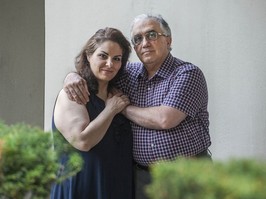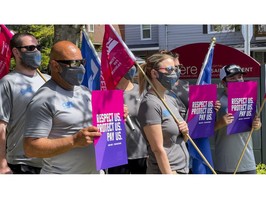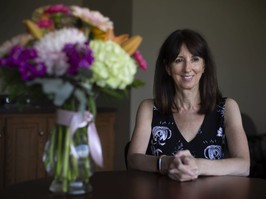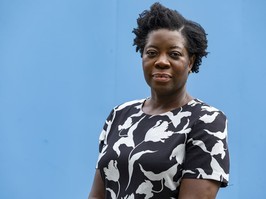legacy of racism, residential schools in health care
it would be incorrect to think of the racism of residential schools as separate from systemic racism in health care.
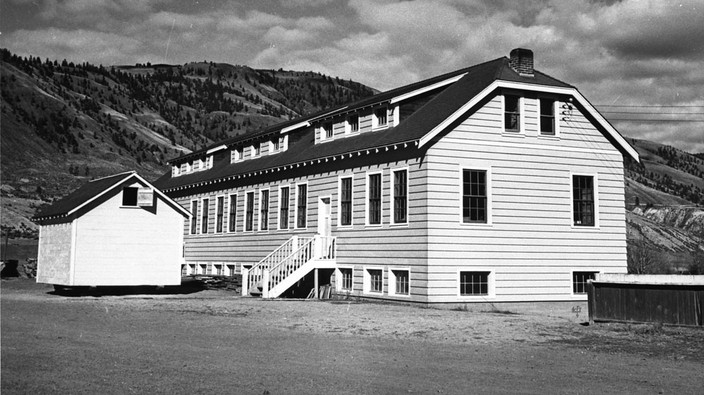
classroom building at kamloops indian residential school circa 1950.
(department of indian affairs and northern development/library and archives canada),
by:
“we didn’t know what he was on.”
that’s what the emergency room physician said to me when i asked why my father, then 49, wasn’t sedated even though he was on a ventilator and in shock. my dad is alive today because i was a second year internal medicine resident and was able to get to the emergency room and take control of the health care he was receiving.
it was the most traumatic moment of my life.
i relived the impact of that systemic racism when brian sinclair died. when joyce echaquan died. when eishia hudson died. and again when the bodies of 215 children, who died at the kamloops indian residential school and were buried in unmarked graves, were found.
each tragic discovery or incident is an opportunity to act. but repeatedly canada’s decision is no action — or insufficient action, and the next thing happens and we’re forced to grieve and call for action again.
like many of my indigenous physician colleagues, the anger and grief of these incidents has shaped my career — providing powerful fuel to lead change even when, and especially when, there is resistance to that change. we work for the safety of our loved ones and remain unwilling to settle for the status quo that inaction upholds.
advertisement
assimilating indigenous peoples
it would be incorrect to think of the racism of residential schools as separate from systemic racism in health care.
in march of 1942, dr. percy e. moore, who was superintendent of the medical service branch of the federal department of indian affairs at the time, co-led a trip of scientific and medical researchers to first nations communities in northern manitoba.
the purpose of that trip was to study the nutritional status of first nations people. this was followed by a series of controlled experiments in some first nation communities and indian residential schools without informed consent or even knowledge that the experiments were taking place.
the reasons moore thought that these nutritional experiments were necessary wasn’t for the health and well-being of indigenous peoples. rather, he felt addressing the poor health and nutrition of indigenous peoples was necessary to protect the white population from indian “reservoirs and vectors of disease.”
he also saw it as important to fulfil the longer term goal of assimilating indigenous peoples into the canadian population. this medical experimentation, as well as the health services delivered by indian affairs, had the same purpose as residential schools — “to kill the indian in the child.”
advertisement
moore still has a federal hospital named after him in hodgson, man., which provides health services to several nearby first nation communities.
inaction in the face of need
malnutrition and crowding in residential schools were root causes of widespread infectious diseases like tuberculosis. they also contributed to the devastating toll on students during the 1918-19 influenza pandemic.
food insecurity and overcrowded housing contributed to the significant disproportionate impacts of h1n1 on first nations people. these factors are also contributing to the significant disproportionate impacts of covid-19 on first nations people.
dr. camara jones, former president of the american public health association, has described inaction in the face of need as one form of institutionalized racism.
we have long had evidence of the need. we have similar long evidence of inaction.
breeding mistrust
systemic racism has widely been acknowledged to breed mistrust in the health-care system. our personal experiences of racism in health care breed this mistrust.
when the catastrophic and public events such as the deaths of brian sinclair and joyce echaquan occur — separated by time but without evidence of action in between — our mistrust is furthered. when accountability comes because a dying woman uses social media to broadcast the treatment she is receiving and not because of internal intervention or safeguards, that demonstrates the mistrust is well deserved.
advertisement
the coroner’s inquest into echaquan’s death just finished. and although the final report with its recommendations will likely take months, coroner gehane kamel stated her hope is that it would be the “foundation of a new social pact that will bring us to say, ‘never again.’” but with the refusal of the québec government to acknowledge the systemic racism in health care that led to echaquan’s death, it is hard to believe that the social pact has in fact changed.
when the covid-19 vaccine rollout started, there was a lot of speculation that indigenous people would be more vaccine hesitant and exploration of potential reasons included past medical experiementation.
that speculation has seemingly overestimated what the hesitancy would be. in places like manitoba, as of the end of may, the only three health districts where over 80 per cent of people have received their first dose are health districts comprised of first nations communities. the credit for this lies most likely with first nations leaders who have worked hard to address mistrust and ensure vaccines are accessible.
structural racism created the conditions that put indigenous people at higher risk for covid-19. inequitable access to culturally safe health care that is free of racism layers on and furthers these disproportionate impacts.
advertisement
rather than labelling indigenous people hesitant, health systems should engage in critical self-reflection on what they have done to create mistrust, and what action they need to take to rebuild that trust.
the legacy is embedded in our society
the legacy of residential schools is not just in the intergenerational trauma and impacts on indigenous families and communities — it is also in the health care system.
the legacy is displayed through canada’s failure to act in ways that show that racism will no longer be tolerated in any space and that our lives, indigenous lives, are valued: past, present and future.
a commitment to eliminating racism must be reflected in accountability mechanisms that focus on the impacts of co-ordinated and consistent anti-racist action.
until that happens, we will do what we can to heal from this and prepare ourselves to grieve again.
this article is republished from the conversation under a creative commons license. read the original article.
 5 minute read
5 minute read

